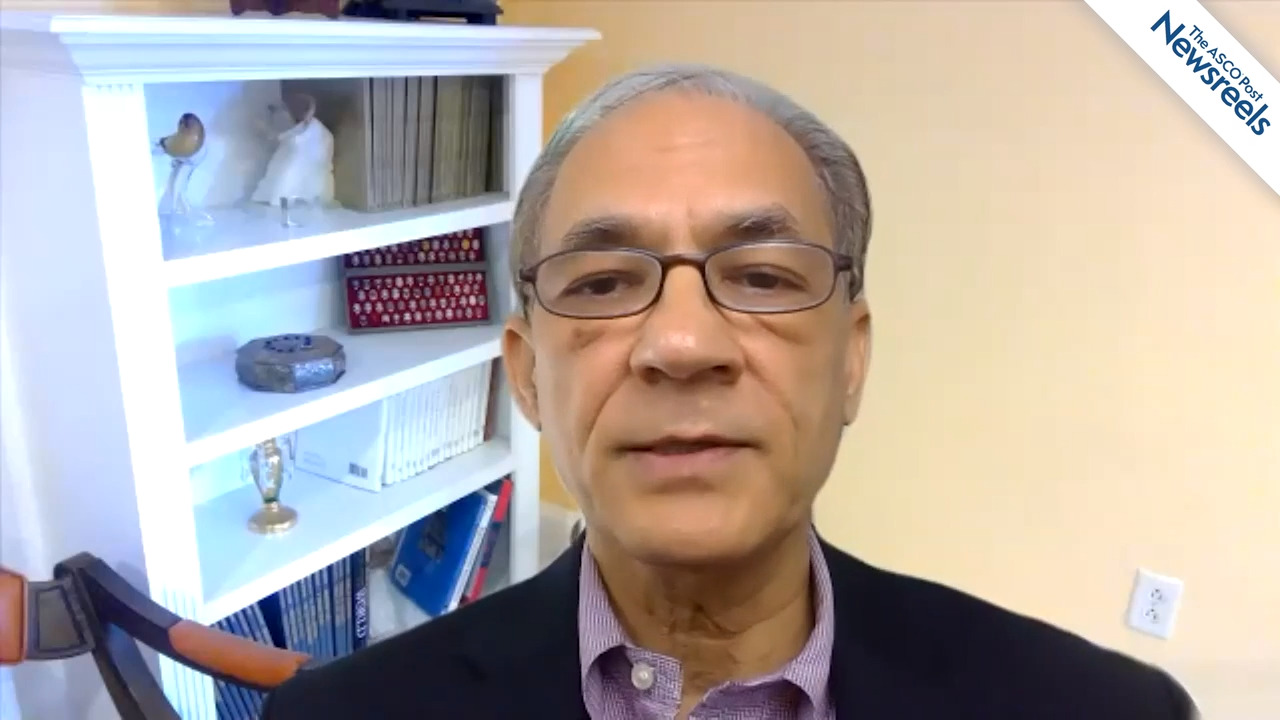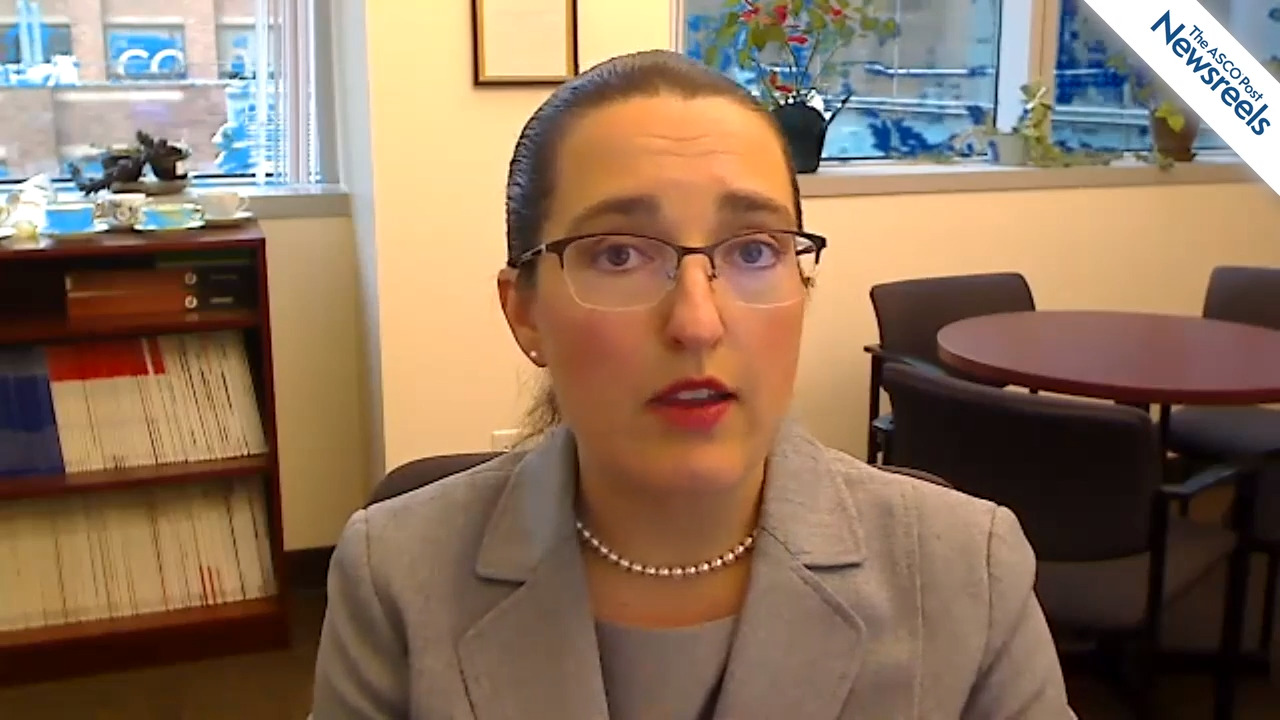Expert Point of View: Philip McCarthy, MD
Philip McCarthy, MD, Professor of Oncology and Internal Medicine and Director of the Transplant and Cellular Therapy Center at Roswell Park Comprehensive Cancer Center, Buffalo, New York, found the results of the DREAMM-6 study to be “exciting and promising.” He commented: “The overall response...
Belantamab Mafodotin Shows Activity in Relapsed or Refractory Myeloma
Treatment of relapsed or refractory multiple myeloma yielded responses with the antibody-drug conjugate belantamab mafodotin, both as a single agent and in combination with bortezomib and dexamethasone. Two reports from the DREAMM team expanded on these findings at the ASCO20 Virtual Scientific...
Expert Point of View: Axel Grothey, MD
Sharing his perspective on KEYNOTE-177 with The ASCO Post was Axel Grothey, MD, Director of GI Cancer Research at the West Cancer Center, OneOncology, Memphis. “This is a very important, highly anticipated study,” he said. “It’s the first randomized trial of any checkpoint inhibitor in...
Rates of Progression-Free Survival in MSI-H/dMMR Metastatic Colorectal Cancer Doubled by Pembrolizumab
Upfront treatment with immunotherapy not only improved results in a subset of patients with metastatic colorectal cancer, it doubled the rates of median progression-free survival. These findings—the first of their kind—arose from the interim analysis of the randomized open-label phase III...
Expert Point of View: Jonathan E. Rosenberg, MD
“These data are solid, showing a 7-month improvement in overall survival in patients with stable disease or better after first-line chemotherapy. This is roughly a 50% improvement in survival, which is clinically meaningful. Also, progression-free survival was significantly increased with...
Advanced Bladder Cancer Survival Improved With Maintenance Avelumab
According to an interim analysis of the phase III JAVELIN Bladder 100 trial, rates of survival among patients with advanced urothelial carcinoma who did not progress on first-line platinum-based chemotherapy were significantly prolonged by maintenance therapy with avelumab and best supportive care...
Conference Highlights From the ASCO20 Virtual Scientific Program
The global outbreak of the COVID-19 pandemic forced many cancer societies, including ASCO, to cancel their in-person meetings this year and instead present the latest advancements and new approaches in oncology care via a virtual platform. For the first time in its 56-year history, the ASCO Annual...
Sarah A. Holstein, MD, PhD, on Multiple Myeloma: Expert Perspective on Five Key ASCO20 Abstracts
Sarah A. Holstein, MD, PhD, of the University of Nebraska Medical Center, discusses top myeloma abstracts from the ASCO20 Virtual Scientific Program: the ENDURANCE trial on carfilzomib, lenalidomide, dexamethasone, and bortezomib; the STaMINA study on transplantation strategies; a first-in-human study on the novel CELMoD agent CC-92480 plus dexamethasone; the CARTITUDE-1 trial on CAR T-cell therapy; and a phase I study of teclistamab (Abstracts LBA3, 8506, 8500, 8505, and 100).
Michael J. Dickinson, MBBS, DMedSc, on Non-Hodgkin Lymphoma: Early Study Findings With Novel T-Cell–Engaging Bispecific Antibody
Michael J. Dickinson, MBBS, DMedSc, of the Peter MacCallum Cancer Centre, discusses phase I dose-escalation study results on CD20-TCB, which showed activity, including durable complete responses, and manageable safety in heavily pretreated patients with relapsed or refractory non-Hodgkin lymphoma (Abstract S241).
Personalized RNA-Based Vaccine/Atezolizumab Combination Produced Immune Response in Most Patients With Advanced Tumors
AN APPROACH using an RNA-based personalized cancer vaccine called RO7198457 in combination with the PD-L1 inhibitor atezolizumab has shown a preliminary benefit, according to an early study in patients with advanced solid tumors. The novel combination was well tolerated, and 8% of patients showed a ...
Lenvatinib Plus Pembrolizumab for Advanced Gastric Cancer
In the Japanese single-center phase II EPOC1706 trial reported in The Lancet Oncology, Kawazoe et al found high objective response among patients with advanced gastric cancer who received the combination of lenvatinib and pembrolizumab as first- or second-line treatment. Study Details The trial...
Personalized RNA-Based Vaccine/Atezolizumab Combination Produced Immune Response in Most Patients With Advanced Tumors
AN APPROACH using an RNA-based personalized cancer vaccine called RO7198457 in combination with the PD-L1 inhibitor atezolizumab has shown a preliminary benefit, according to an early study in patients with advanced solid tumors. The novel combination was well tolerated, and 8% of patients showed a ...
Lenvatinib Plus Pembrolizumab for Advanced Gastric Cancer
In the Japanese single-center phase II EPOC1706 trial reported in The Lancet Oncology, Kawazoe et al found high objective response among patients with advanced gastric cancer who received the combination of lenvatinib and pembrolizumab as first- or second-line treatment. Study Details The trial...
FDA Approves Maintenance Avelumab for the Treatment of Advanced Urothelial Carcinoma
On June 30, the U.S. Food and Drug Administration (FDA) approved avelumab (Bavencio) for the maintenance treatment of patients with locally advanced or metastatic urothelial carcinoma that has not progressed with first-line platinum-containing chemotherapy. JAVELIN Bladder 100 Efficacy of avelumab...
Addition of First-Line Atezolizumab to Vemurafenib and Cobimetinib in Patients With Unresectable Advanced BRAF V600–Mutant Melanoma
As reported in The Lancet by Gutzmer et al, the phase III IMspire150 trial has shown that the addition of atezolizumab to BRAF and MEK inhibitor therapy with vemurafenib and cobimetinib improved progression-free survival in first-line treatment of patients with unresectable BRAF V600–mutant...
FDA Approves Pembrolizumab for the First-Line Treatment of MSI-H/dMMR Colorectal Cancer
On June 29, the U.S. Food and Drug Administration (FDA) approved pembrolizumab (Keytruda) for the first-line treatment of patients with unresectable or metastatic microsatellite instability–high (MSI-H) or mismatch repair–deficient (dMMR) colorectal cancer. KEYNOTE-177 Approval was based on...
FDA Approves Combination of Pertuzumab, Trastuzumab, and Hyaluronidase-zzxf for HER2-Positive Breast Cancer
On June 29, the U.S. Food and Drug Administration (FDA) approved a new fixed-dose combination of pertuzumab, trastuzumab, and hyaluronidase-zzxf (Phesgo) for subcutaneous injection in the following indications: Use in combination with chemotherapy as: Neoadjuvant treatment for patients with...
Parameswaran Hari, MD, on Multiple Myeloma: Expert Commentary on Four Key Abstracts
Parameswaran Hari, MD, of the Medical College of Wisconsin, discusses data from four trials and their clinical implications for the treatment of patients with multiple myeloma: the KarMMa and EVOLVE studies on CAR T cell therapies; SWOG-1211 on bortezomib, lenalidomide, and dexamthasone with/without elotuzumab for newly diagnosed, high-risk disease; and the GMMGCONCEPT trial on isatuximab, carfilzomib, lenalidomide, and dexamethasone in front-line treatment (Abstracts 8503, 8504, 8507, 8508).
Biomarker Combination May Help Predict Response to Immunotherapy in Patients With Metastatic Urothelial Carcinoma
In patients with metastatic urothelial carcinoma, a novel combination of biomarkers from baseline tumor tissues was predictive of improved clinical responses and prolonged survival following treatment with immune checkpoint inhibitors, according to findings published by Goswami et al in Science...
Long-Term Outcomes With Pembrolizumab for Cisplatin-Ineligible Advanced Urothelial Cancer
As reported in the Journal of Clinical Oncology by Vuky et al, long-term follow-up in the phase II KEYNOTE-052 study has shown durable responses with first-line pembrolizumab in cisplatin-ineligible locally advanced or metastatic urothelial cancer, with higher response rates and longer survival in...
Addition of Rituximab to Standard Chemotherapy in Pediatric Patients With High-Risk, Mature B-Cell Non-Hodgkin Lymphoma
In a European Intergroup for Childhood Non-Hodgkin Lymphoma/Children’s Oncology Group phase III trial reported in The New England Journal of Medicine, Minard‑Colin et al found that the addition of rituximab to standard Lymphomes Malin B (also known as Lymphome Malin de Burkitt, or LMB) chemotherapy ...
FDA Approves Pembrolizumab for Recurrent or Metastatic Cutaneous Squamous Cell Carcinoma
On June 24, the U.S. Food and Drug Administration (FDA) approved pembrolizumab (Keytruda) for patients with recurrent or metastatic cutaneous squamous cell carcinoma that is not curable with surgery or radiation. KEYNOTE-629 Efficacy was investigated in KEYNOTE-629, a multicenter, multicohort,...
Nikhil C. Munshi, MD, on Multiple Myeloma: Idecabtagene Vicleucel in Patients With Relapsed or Refractory Disease
Nikhil C. Munshi, MD, of Dana-Farber Cancer Institute, discusses initial results from the KarMMa tria, showing that idecabtagene vicleucel, a B-cell maturation antigen-targeted CAR T-cell therapy, demonstrated deep and durable responses in patients with heavily pretreated relapsed or refractory multiple myeloma. Efficacy and safety data support a favorable clinical benefit-risk profile across the target dose range (Abstract 8503).
Expert Point of View: Michael S. Lee, MD, and Autumn McRee, MD
DESTINY-CRC01 study discussant, Michael S. Lee, MD, Assistant Professor of Medicine, Lineberger Comprehensive Cancer Center, University of North Carolina, Chapel Hill, called the findings “most promising” for the subsequent anti-HER2 treatment of HER2-positive metastatic colorectal cancer. The...
Trastuzumab Deruxtecan Shows Benefit in Refractory Colorectal Cancer
Having recently gained approval in metastatic breast cancer, fam-trastuzumab deruxtecan-nxki (T-DXd) is now proving its worth in metastatic colorectal cancer, according to results of the phase II DESTINY-CRC01 study in patients with HER2-positive disease.1 T-DXd is an antibody-drug conjugate...
Salvage Nivolumab/Ipilimumab After Prior Immune Checkpoint Inhibitor Therapy in Patients With Metastatic Renal Cell Carcinoma
In a study reported in the Journal of Clinical Oncology, Gul et al found that salvage therapy with nivolumab/ipilimumab was capable of producing a response after prior programmed cell death 1 (PD-1) pathway inhibitor therapy in some patients with metastatic renal cell carcinoma. Study Details The...
Egbert F. Smit, MD, PhD, on NSCLC: Treatment With Fam-trastuzumab Deruxtecan
Egbert F. Smit, MD, PhD, of the Netherlands Cancer Institute, discusses interim results from the DESTINY-Lung01 trial of fam-trastuzumab deruxtecan in patients with HER2-mutated metastatic non–small cell lung cancer. The data show clinical activity with high overall response rates and durable responses (Abstract 9504).
Lakshmi Nayak, MD, on Primary CNS Lymphoma: The Search for Optimal First-Line Treatment
Lakshmi Nayak, MD, of Dana-Farber Cancer Institute, reviews two key abstracts on newly diagnosed primary central nervous system lymphoma and treatment with whole-brain radiotherapy, methotrexate, temozolomide, rituximab, procarbazine, vincristine, and cytarabine (Abstracts 2500 and 2501).
Suresh S. Ramalingam, MD, on NSCLC: Nivolumab Plus Ipilimumab vs Chemotherapy
Suresh S. Ramalingam, MD, of Emory University, discusses a 3-year update from the CheckMate 227, Part 1, trial, which showed that nivolumab plus ipilimumab continued to provide durable and long-term overall survival benefit vs platinum-doublet chemotherapy as first-line treatment for patients with advanced non–small cell lung cancer (Abstract 9500).
Nirav Niranjan Shah, MD, on DLBCL: Autologous Transplant vs CAR T-Cell Therapy
Nirav Niranjan Shah, MD, of the Medical College of Wisconsin, explores whether autologous transplantation, in patients with relapsed diffuse large B-cell lymphoma who achieve only a PET/CT-positive partial remission, is appropriate in the era of CAR T-cell therapy (Abstract 8000).
Tafasitamab Plus Lenalidomide for Relapsed or Refractory Diffuse Large B-Cell Lymphoma
In the phase II L-MIND trial reported in The Lancet Oncology, Gilles Salles, MD, and colleagues found that the combination of the Fc-enhanced anti-CD19 monoclonal antibody tafasitamab plus lenalidomide produced responses in patients with relapsed or refractory diffuse large B-cell lymphoma...
Rachel E. Sanborn, MD, on NSCLC: Maximizing the Benefits of Targeted Therapies for EGFR-Mutated Disease
Rachel E. Sanborn, MD, of the Providence Cancer Institute, discusses three key abstracts on EGFR-mutated non–small cell lung cancer: a final overall survival analysis of bevacizumab plus erlotinib; concurrent osimertinib plus gefitinib for first-line treatment; and first-line treatment with a tyrosine kinase inhibitor with or without aggressive upfront local radiation therapy (Abstracts 9506, 9507, 9508).
Immunogenomic Characteristics of Advanced Clear Cell Kidney Cancer Treated With Checkpoint Inhibitors
By analyzing tumors from patients treated with immunotherapy for advanced kidney cancer in three clinical trials, scientists have identified several features of the tumors that influence their response to immune checkpoint inhibitors. The research was presented during the ASCO20 Virtual Scientific...
FDA Approves Pembrolizumab for Adults and Children With Tumor Mutational Burden–High Solid Tumors
On June 16, the U.S. Food and Drug Administration (FDA) granted accelerated approval to pembrolizumab (Keytruda) for the treatment of adult and pediatric patients with unresectable or metastatic tumor mutational burden–high (TMB-H; ≥ 10 mutations/megabase [mut/Mb]) solid tumors, as determined by an ...
Douglas B. Johnson, MD, on Melanoma: Clinical Trials Update on PD-1 and CTLA-4 Blockade
Douglas B. Johnson, MD, of Vanderbilt University Medical Center, discusses three important melanoma abstracts: the need for more than two doses of nivolumab plus ipilimumab in combination immunotherapy; antitumor activity for low-dose ipilimumab with pembrolizumab after disease progression on PD-1 antibodies; and ipilimumab alone or in combination with anti–PD-1 therapy for metastatic disease resistant to PD-1 monotherapy (Abstracts 10003, 10004, and 10005).
First-Line Osimertinib/Bevacizumab for Metastatic EGFR-Mutant Lung Cancer
In the phase II portion of a single-center phase I/II trial reported in JAMA Oncology, Yu et al found that the combination of first-line osimertinib and bevacizumab resulted in a high rate of 1-year progression-free survival in patients with metastatic EGFR-mutant lung cancer. As stated by the...
FDA Extends Indication of Gemtuzumab Ozogamicin for Pediatric Patients With CD33-Positive AML
On June 16, the U.S. Food and Drug Administration (FDA) extended the indication of gemtuzumab ozogamicin (Mylotarg) for newly diagnosed CD33-positive acute myeloid leukemia (AML) to include pediatric patients aged 1 month and older. AAML0531 Efficacy and safety in the pediatric population were...
Immune Checkpoint Inhibitor Rechallenge in Metastatic Renal Cell Carcinoma
In a study presented at the ASCO20 Virtual Scientific Program (Abstract 5077) and published as a brief report in JAMA Oncology, Ravi et al found that rechallenge with immune checkpoint inhibitor therapy was capable of producing responses in patients with metastatic renal cell carcinoma, including...
Pembrolizumab Plus Chemoradiotherapy for Locally Advanced Head and Neck Squamous Cell Carcinoma
In a phase Ib study reported in the Journal of Clinical Oncology, Powell et al found that the addition of pembrolizumab to curative chemoradiotherapy was safe and associated with response in patients with locally advanced head and neck squamous cell carcinoma. Study Details The U.S. multicenter...
Meta-analysis of Outcomes With Checkpoint Inhibitor Treatment in Advanced Microsatellite Instability–High Cancers
A meta-analysis of published studies of immune checkpoint inhibition for advanced microsatellite instability–high (MSI-H) cancers—published as a brief report in JAMA Oncology by Petrelli et al—found high activity of these therapies across tumor types and evaluated agents. Study Details The...
Real-World Outcomes With Axicabtagene Ciloleucel Therapy in Relapsed or Refractory Large B-Cell Lymphoma
In a retrospective study reported by Nastoupil et al in the Journal of Clinical Oncology, researchers in the U.S. Lymphoma CAR T Consortium described outcomes with standard-of-care use of the autologous CD19-directed chimeric antigen receptor (CAR) T-cell therapy axicabtagene ciloleucel in patients ...
FDA Approves Nivolumab for Pretreated Patients With Esophageal Squamous Cell Carcinoma
On June 10, the U.S. Food and Drug Administration (FDA) approved nivolumab (Opdivo) for patients with unresectable advanced, recurrent, or metastatic esophageal squamous cell carcinoma after prior fluoropyrimidine- and platinum-based chemotherapy. ATTRACTION-3 Efficacy was investigated in...
Expert Point of View: Siwen Hu-Lieskovan, MD, PhD
Formal discussant of KEYNOTE-555, Siwen Hu-Lieskovan, MD, PhD, of Huntsman Cancer Institute, Salt Lake City, commented on the advantages of the new schedule. “Along with the promise of prolonged survival associated with checkpoint inhibitors, convenience, quality of life, and reducing health-care...
KEYNOTE-555 Supports 6-Week Pembrolizumab Dosing Schedule in Melanoma
A less-frequent, more-convenient dosing schedule for pembrolizumab (400 mg every 6 weeks) was deemed safe and effective in patients with unresectable or metastatic melanoma, according to interim data from cohort B enrolled in the KEYNOTE-555 trial. These findings were presented at the 2020 Virtual...
Expert Point of View: Yvonne Chen, PhD, and Joseph Alvarnas, MD
Formal discussant Yvonne Chen, PhD, Associate Professor of Microbiology, Immunology, and Molecular Genetics at the University of California, Los Angeles, said the issue of toxicity was important, since high levels of toxicity were observed in this small group of five patients. “All five patients...
Off-the-Shelf CAR T-Cell Therapy Makes Inroads in Acute Lymphoblastic Leukemia
Chimeric antigen receptor (CAR) T-cell therapy known as TruUCAR GC027 may prove to be useful in the treatment of adult patients with relapsed or refractory T-cell acute lymphoblastic leukemia (T-ALL) and potentially other hematologic malignancies. Preliminary results in a small number of patients...
Expert Point of View: TROPHIMMUN Trial
Two gynecologic oncologists and ASCO’s Chief Medical Officer and Executive Vice President Richard L. Schilsky, MD, FACP, FSCT, FASCO, commented on the findings of the TROPHIMMUN trial for The ASCO Post. “The authors demonstrate efficacy of a new treatment approach for gestational trophoblastic...
Selpercatinib for Lung and Thyroid Cancers With RET Gene Mutations or Fusions
On may 8, 2020, selpercatinib was granted accelerated approval for the following indications: Adult patients with metastatic RET fusion-positive non–small cell lung cancer (NSCLC) Adult and pediatric patients ≥ 12 years of age with advanced or metastatic RET-mutant medullary thyroid cancer who...
Ursula A. Matulonis, MD, on Ovarian Cancer: Roundup of Studies on Olaparib, Cediranib, Mirvetuximab Soravtansine, Bevacizumab, and Pembrolizumab
Ursula A. Matulonis, MD, of Dana-Farber Cancer Institute, discusses three important studies focusing on newer therapies for patients with recurrent platinum-sensitive, platinum-agnostic, and advanced recurrent ovarian cancers (Abstracts 6003, 6004, and 6005).
Safety and Patient-Reported Outcomes From the IMpower150 Trial in Metastatic Nonsquamous NSCLC
A safety and patient-reported outcome analysis from the IMpower150 trial, reported in the Journal of Clinical Oncology by Martin Reck, PhD, and colleagues, indicated that atezolizumab plus bevacizumab and chemotherapy appeared to be a manageable and tolerable regimen when compared with atezolizumab ...











